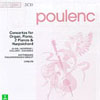Poulenc Concertos
View record and artist detailsRecord and Artist Details
Composer or Director: Francis Poulenc
Label: Ultima
Magazine Review Date: 11/1998
Media Format: CD or Download
Media Runtime: 106
Mastering:
DDD
Catalogue Number: 3984-21342-2

Tracks:
| Composition | Artist Credit |
|---|---|
| Concerto for Organ, Strings and Timpani |
Francis Poulenc, Composer
Francis Poulenc, Composer James Conlon, Conductor Marie-Claire Alain, Organ Rotterdam Philharmonic Orchestra |
| Concert champêtre |
Francis Poulenc, Composer
Francis Poulenc, Composer James Conlon, Conductor Rotterdam Philharmonic Orchestra Ton Koopman, Harpsichord |
| Concerto for Two Pianos and Orchestra |
Francis Poulenc, Composer
Francis Poulenc, Composer François-René Duchâble, Piano James Conlon, Conductor Jean-Philippe Collard, Piano Rotterdam Philharmonic Orchestra |
| Concerto for Piano and Orchestra |
Francis Poulenc, Composer
Francis Poulenc, Composer François-René Duchâble, Piano James Conlon, Conductor Rotterdam Philharmonic Orchestra |
| Aubade |
Francis Poulenc, Composer
Francis Poulenc, Composer François-René Duchâble, Piano James Conlon, Conductor Rotterdam Philharmonic Orchestra |
Author: Lionel Salter
There is no mention whatever in the skimpy notes here of the “concerto choreographique” Aubade, but all the same one wonders how, in the face of the evidence, the writer can confidently state that Poulenc wrote only four concertos. This issue has the virtue, in fact, of gathering together all his concertos in performances that are intrinsically highly laudable; but, with the exception of the Organ Concerto, which with the Flentrop instrument in Rotterdam comes over with admirable clarity and in the right proportions, they are marred by faults of balance. The worst sufferer is the Harpsichord Concerto, where the solo instrument sounds pathetically feeble: the fault was initially Poulenc’s, who in 1927 had had no experience of the harpsichord and pitted it against too large an orchestra, but the recording team then failed to realize that the work had been intended for Landowska’s robust-toned Pleyel and made no allowances for an instrument of very different kind. Even in the piano works there are problems. In the Aubade the solo instrument, often mercilessly loud, frequently covers orchestral passages it is meant to be accompanying; much the same applies to the first movement of the Piano Concerto, though subsequently someone seems to have woken up to the imbalance and done something about it. The Concerto for Two Pianos, the performance of which sparkles with verve (like most of the other works) but is too casually cool in the Larghetto, again has the pianos very forwardly placed, but more acceptably. The bargain price of the discs may well be an attraction, but intending buyers should at least be aware of the drawbacks in these 1984 recordings.'
Discover the world's largest classical music catalogue with Presto Music.

Gramophone Digital Club
- Digital Edition
- Digital Archive
- Reviews Database
- Full website access
From £8.75 / month
Subscribe
Gramophone Full Club
- Print Edition
- Digital Edition
- Digital Archive
- Reviews Database
- Full website access
From £11.00 / month
Subscribe
If you are a library, university or other organisation that would be interested in an institutional subscription to Gramophone please click here for further information.




